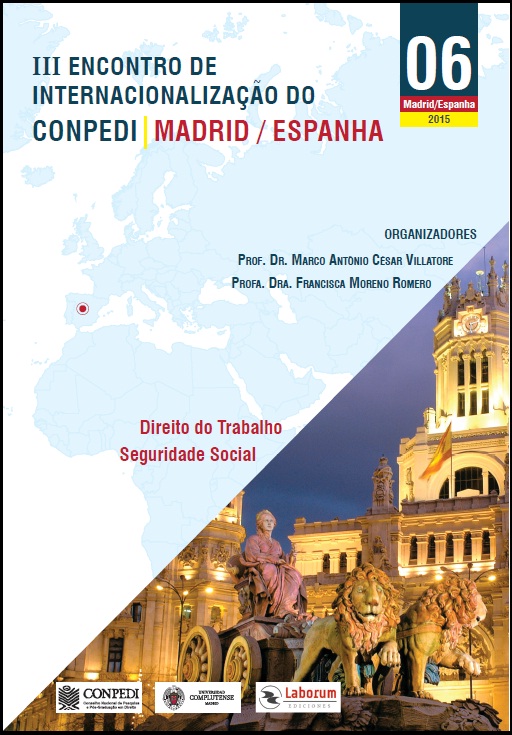The Axiom between Work Requirement Excessive Versus the Right to Recreation Worker : Analysis under the Employer Accountability of Optics
Main Article Content
Abstract
Labor relations focused throughout history, legal worker material rights in exchange of services. However, gradually, there was the need for worker appreciation of his human essence, going to glimpse the importance of respecting the intrinsic goods, especially fundamental rights. This study, prepared by the deductive method with doctrinal and jurisprudential basis, justified by observing the gulf between the legal dictates and empirical experience of workers at full exercise of leisure, primarily dealing with the evolution of the recognition of the fundamental rights of workers, passing to the theme of excessive working hours to increase the employer’s profit and subsequently address the responsibility of the latter, when exacerbated working hours subtracts the leisure time of workers. The democratic state imposes the full exercise of citizenship through freedom of every individual’s rights, above all, the social and the right to leisure has become a well constitutionally guaranteed. However, capitalist competition entails the unbridled pursuit of material goods arising from high productivity coming from overwork, which not only harms the health and worker’s life, deprived of living with loved ones, their integration into society and the full exercise of leisure, with autonomy to choose how to enjoy their free time in a dignified manner without the worry or the imposition of produce for their livelihood. Thus, the journey of excessive work affront the fundamental right to pleasure, leaving no room for the realization of the same in violation of the exercise of the worker’s citizenship, and entailing the responsibility of the employer regarding the illicit violates a right of fundamental importance of workers.
Downloads
Article Details
Autores que publicam nesta revista concordam com os seguintes termos:
O(s) autor(es) autoriza(m) a publicação do texto na da revista;
O(s) autor(es) garantem que a contribuição é original e inédita e que não está em processo de avaliação em outra(s) revista(s);
A revista não se responsabiliza pelas opiniões, idéias e conceitos emitidos nos textos, por serem de inteira responsabilidade de seu(s) autor(es);
É reservado aos editores o direito de proceder a ajustes textuais e de adequação às normas da publicação.
Autores mantém os direitos autorais e concedem à revista o direito de primeira publicação, com o trabalho simultaneamente licenciado sob a Licença Creative Commons Attribution que permite o compartilhamento do trabalho com reconhecimento da autoria e publicação inicial nesta revista.
Autores têm autorização para assumir contratos adicionais separadamente, para distribuição não-exclusiva da versão do trabalho publicada nesta revista (ex.: publicar em repositório institucional ou como capítulo de livro), com reconhecimento de autoria e publicação inicial nesta revista.
Autores têm permissão e são estimulados a publicar e distribuir seu trabalho online (ex.: em repositórios institucionais ou na sua página pessoal) a qualquer ponto antes ou durante o processo editorial, já que isso pode gerar alterações produtivas, bem como aumentar o impacto e a citação do trabalho publicado (Veja O Efeito do Acesso Livre) emhttp://opcit.eprints.org/oacitation-biblio.html
References
BOBBIO, Norberto, A Era dos Direitos. SP: Editora campus, 2004.
BONAVIDES, Paulo. Curso de Direito Constitucional. Editora Malheiros, 2002.
CALVET, Otavio Amaral. Direito ao lazer nas Relações de Trabalho. São Paulo: LTR, 2006.
DALLEGRAVE NETO, José Affonso. Responsabilidade Civil no Direito do Trabalho. SP: LTr, 2009.
DELGADO, Maurício Godinho. Curso de Direito do Trabalho. LTr, 2008.
DUMAZEDIER, Joffre. Lazer e cultura popular. São Paulo: Perspectiva, 1976.
FIORELLI, José Osmir; MALHADAS JR, Marco Julio Olivé. Psicologia nas Relações de Trabalho.São Paulo: LTr, 2003, pág 266.
GAGLIANO, Pablo Stolze; PAMPLONA FILHO, Rodolfo. Novo curso de Direito Civil. Contratos. São Paulo: Saraiva, 2005.
MAIOR, Jorge Luiz Souto. Do Direito à Desconexão do Trabalho. Revista do Tribunal Regional do Trabalho da 15ª Região Disponível em: http://www.portal.trt15.jus.br/biblioteca/revista23 acessado em 14/05/2015.
MARTINS, Sergio Pinto. Direitos Fundamentais Trabalhistas. São Paulo: Atlas, 2009.
MIRANDA, Jorge. Manual de Direito Constitucional. São Paulo: Método, 1998.
NASCIMENTO, Amauri Mascaro. Curso do Direito do Trabalho, São Paulo: Saraiva, 2009.
NIETZSCHE, F. Humano Demasiado Humano. Trad. Paulo César de Souza. São Paulo: Companhia das Letras, 2000, p. 37.
PIOVESAN, Flávia. Direitos Humanos e o Direito Constitucional Internacional, rev.ampliada e atualizada. São Paulo:Saraiva, 2010.
REQUIXA, Renato. O lazer no Brasil. São Paulo: Brasiliense, 1977, p.51.
RUFINO, Regina Célia Pezzuto. Assédio Moral no Âmbito da Empresa, SP: LTr, 2011.
SARLET, Ingo Wolfgang. Dignidade da pessoa humana e direitos fundamentais na Constituição Federal de 1988. Porto Alegre: Livraria do Advogado, 200, p.37.
VALE, André Rufino. Constituição e Direito Privado. Algumas Considerações sobre a Eficácia dos Direitos Fundamentais nas Relações Privadas. Revista do Direito Público n. 06 – out., nov. e dez/2004, p.32.
Webgrafia Geral
OIT. Site oficial. Disponível em:
TRIBUNAL SUPERIOR DO TRABALHO. Site oficial. Disponível em:
TRIBUNAL SUPERIOR DO TRABALHO. Site oficial. Disponível em:
CONJUR. Site oficial: http://www.conjur.com.br/2015-mai-12/magazine-luiza-condenado-100-mil-jornada-excessiva, acessado em 13/05/2015.





